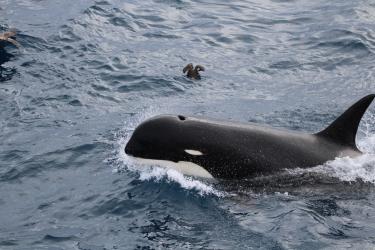Sometimes the wheels of justice turn slowly. In this case, they have been turning for more than 7 years.
“It’s been a long time coming; our team worked very hard to gather the appropriate evidence to support the case prosecuted by the Department of Justice,” said Logan Gregory, OLE acting deputy director.
George Estudante, doing business as Basic Fisheries, a federally permitted fish dealer located in Marion, Mass., pleaded guilty in 2014 to a single felony count of submitting false reports to the National Oceanic and Atmospheric Administration (NOAA), in violation of the Lacey Act. On Wednesday, May 20, Estudante was sentenced to two months incarceration, followed by six months home detention, three years supervised probation, and 100 hours of community service.
“It’s a win for honest fishermen,” said Gregory. “Hopefully this sends an appropriate message that marine resource crimes are serious and those who purposefully violate the law for financial gain will be brought to justice.”
The case began in 2008 with a covert operation involving OLE special agents, Maryland Department of Resources Police, Virginia Marine Police, and cooperative witnesses. The mission was to gather evidence and information about the alleged illegal business practices of Estudante.
The investigation documented 13 separate occasions where he purchased on average upwards of 750 pounds of scallops – a gross excess of the federally permitted vessels’ legal landing limit of 400 pounds. This was a direct violation of the Lacey Act, a federal conservation law in the United States that prohibits trade in wildlife, fish, and plants that have been illegally taken, possessed, transported or sold. For each incident of over-purchases, Estudante concealed the excesses by only reported to NOAA the legal amount, for which he paid with a handwritten check, and covered his tracks by paying with cash for the remaining illegal portions.
“Fishing is a dangerous and demanding profession that supports many American families and fishing communities. Hard working, law abiding fishers deserve a fair and honest price for what is caught and sold,” said Todd Dubois, OLE assistant director. “Those that ignore fisheries laws and quotas are not only reducing the market price for legally harvested product, they are also undermining fisheries management efforts and adversely impacting fish stocks for future generations of fishers and seafood consumers.”
Gregory added, “OLE works hard to level the playing field so that fishermen and businesses that comply with the regulations are not put at a disadvantage by the illegal acts of those who purposefully break the rules.”


